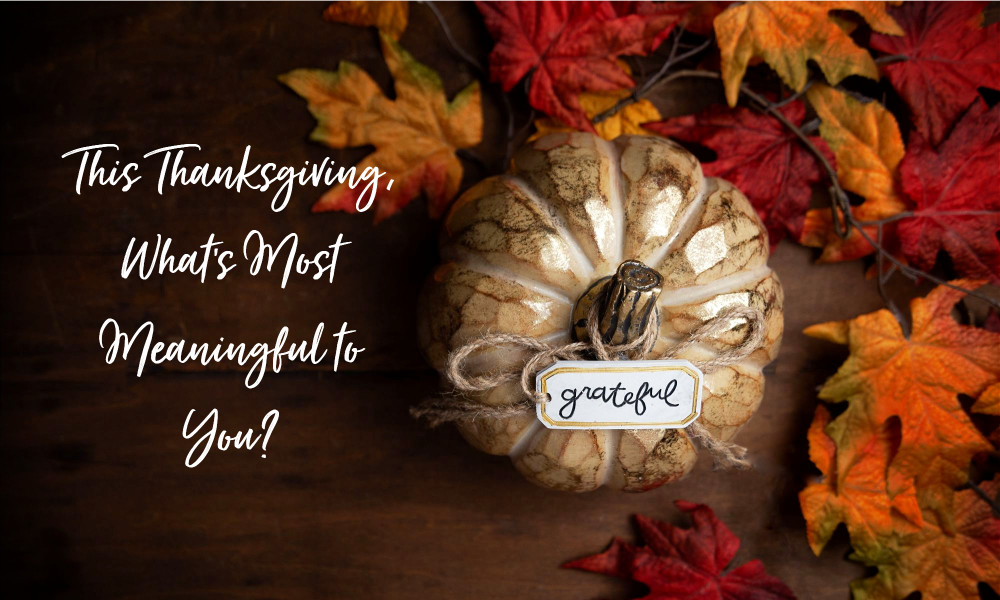It’s officially Thanksgiving prep season, which means finalizing your holiday plans, searching for recipes, making extra grocery store runs, and pulling out loose-fitting clothes to wear on the big day. All while still getting everything done at work. Oh, and putting plans in place that allow you to take a midweek Thanksgiving break without worrying about being totally overwhelmed when you get back (This last push at the end of the year is always tough for time management and productivity, so if you’re already worrying about how you’re going to get it all done before year-end, you’re not alone!).
Thanksgiving – a Season for Gratefulness
The Thanksgiving season also traditionally means taking time to acknowledge and celebrate all the things we’re grateful for. It’s a tradition I love. If you’ve worked with me before, you know I’m an advocate of celebrating all the things that are going well for you. Big or small things, no matter what time of year it is, I always want my clients and team to acknowledge their wins.
Taking a step back from all your self-doubt and stress to look at everything that’s actually going well for you, and everything that you’ve accomplished recently, reminds you how competent and talented you are. That’s certainly useful for time management and productivity, since you’re probably going to feel more engaged and productive when you’re feeling good about yourself and your skills. But it’s also important for your mental and physical health to slow down, relax a little, and focus on the important things.
Taking stock of what’s going well for you is a year-round practice. But once a year, Thanksgiving prompts us to think about a slightly different question…
What Are You Grateful For?
Or put another way: What are the most important and meaningful parts of your life?
That’s really at the heart of the classic Thanksgiving question, isn’t it? The things that we’re most grateful for are the things that would hurt the most to lose. They’re the things that make us feel not just comfortable but truly fulfilled and even joyful in our lives. They’re the most meaningful things to us.
So, I’m cutting to the chase and asking you directly—what’s most meaningful to you?
Most Of Us Would Put Family At The Very Top Of That List.
Research confirms this. In 2017, Pew did two surveys about the things that Americans find meaningful. When respondents were asked open-ended questions about what made their lives fulfilling, 69% of answers included some mention of family.
The next most common responses were:
- Career (mentioned by 34% of people)
- Money (23%)
- Spirituality and faith (20%)
- Friends (19%)
- Activities and hobbies (19%)
- Health (16%)
- Home and surroundings (13%)
- Learning (11%)
Those responses are so interesting. They really highlight the ways in which we’re similar, while showing how different we all are at the same time. Everything on that list of responses is fairly universal. Money, health, friends, home… these are things that most people value, right? And yet, when they were asked to name the things that give their lives meaning, most respondents didn’t rattle off all the same answers. If they had, those percentages would have been much higher.
Instead, I suspect respondents focused in on a few key areas that really mattered to them more than all the others. For one person, family and their faith might be the two core areas that are the most meaningful. Another person might also have family they love, but consider their hobbies and career to be the most fulfilling parts of their life. Meanwhile, someone who has been through serious medical challenges might consider their health to be the most meaningful thing they have.
So, circling back to my earlier question: Are you clear about what’s really meaningful to you specifically?
Identifying what’s really meaningful to you individually serves several purposes this Thanksgiving season.
- Being clear about what fulfills you the most is super useful as you start thinking about New Year’s resolutions and setting goals for next year. How are you going to create goals at work and in your personal life that are aligned with your most meaningful priorities?
- From a time management and productivity perspective, knowing what’s most meaningful for you allows you to schedule your life in a way that prioritizes time for those activities. Maybe that means blocking off more time to participate in a volunteer activity that fulfills you, or shifting your schedule to create a standing weekly dinner with friends.
- Practicing gratitude and reflecting on the good things in our lives can have mental health benefits and reduce stress—something we all could use at the start of another chaotic holiday season.
Plus, if someone at your Thanksgiving table asks everyone to name what they’re grateful for, you’ll have your answers all ready to go. More time to focus on the delicious food in front of you.
3 Ways to Get Clear About What’s Most Meaningful for You
- Survey yourself! Pretend Pew Research has come to you and asked the open-ended question: What’s most meaningful in your life? Now grab a notebook or open a Word document and start writing out a response. No one has to see it but you, so be totally honest. It might be a few sentences or a 10-page document.
- Daydream about a perfect version of your life. I’m not talking “won-the-lottery-and-moved-to-Tuscany” daydreams, but something a little more realistic. If you could create a perfect version of a typical workday, what would that look like? Which work tasks would you spend your time on? Who would you interact with? How would you spend your time after work on this perfect day? In other words, how would you allocate your time if you were in complete control of scheduling the day?
- Reflect on your history of achieving goals that you’ve set for yourself. Have there been any goals that have felt almost easy to achieve because you were so motivated and/or enjoyed them so much? What kind of goals do you tend to drag your feet on more? Is it possible that those goals were things you felt you “should” accomplish rather than things you felt internally driven to accomplish? Spend some time thinking about the driving forces behind your current goals and whether they feel aligned with your real, personal priorities.
If you’re struggling to set aside time for goal-setting, or you just don’t know where to begin with achieving meaningful goals, join us for Time Matters Boot Camp Live. This three-day virtual workshop, happening December 1-3, is designed to help you change the habits and overcome the time management challenges that have been holding you back from living the life you crave. You’ll walk away with a process that allows you to get clear on and achieve your goals for 2023. Click here for information and registration.
Happy Thanksgiving to all who celebrate!
Sarah



